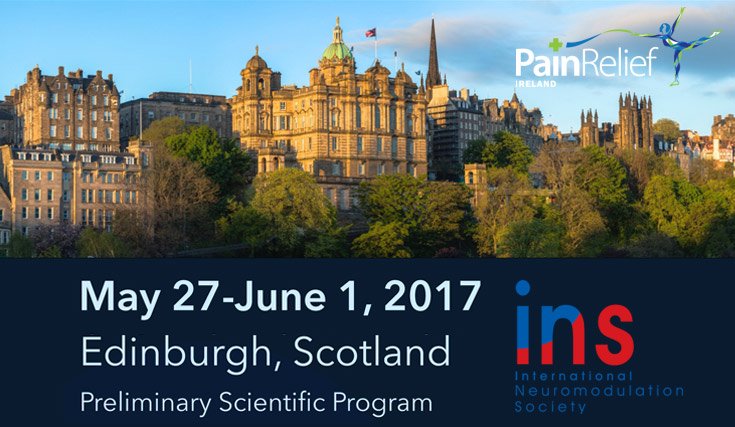
The role of Neuromodulation in pain medicine is changing the lives of more individuals on a daily basis. The evidence presented at the International Neuromodulation Society Congress (INS) recently held in Edinburgh Scotland (and published by Basildon and colleagues 2017) has shown patients with neuropathic pain (nerve pain) treated with spinal cord stimulation experience long-term reductions in pain intensity and increases in health utility and associated quality-adjusted life-years (QALY) gains over a 7 year follow up period.
The future is addressing the concept of "individualised patient care". This comes as no surprise to Dr. Dominic Hegarty (Clinical Director, Pain Relief Ireland). "This is what we want to achieve at Pain Relief Ireland. We understand that 'one size fits all' model of pain management is very old school and it something we have being working on improving".
Over the past week Dr. Hegarty has being involved in the International Neuromodulation Society congress being hosted in Edinburgh. The global leaders in Neuromodulation meet every two years to understand persistent nerve pain and investigate how best to manage it. Data presented at this meeting underlines the need to understand the mechanism of pain generation better and challenges how we use the traditional technical set up. Dr. Nadia Kriek and her colleagues at University Medical Centre Rotterdam established the role of different frequency settings in pain reduction and concluded that for some (ie 52% of cases in a 5 week study) "non-standard" settings were the preferred options. While the concept that individuals only want pain reduction is reasonable for many improved functional capacity, and quality of life are sometimes more important.
Dr. Hegarty believes that in order to "maximise the therapeutic effects of spinal cord stimulation we need to incorporate different programming setting into each device. The challenge for industry is to provide the technology that can meet this demand by allowing different waveform and frequency permutations within the one device". For example the increased longevity of rechargeable spinal cord stimulation devices is a simple and practical improvement.
Fortunately the market leaders such as Medtronic and Boston Scientific are developing new technology all the time and both have manufacturing hubs in Ireland (Medtronic in Galway and Boston Scientific in Clonmel).
Medtonic Inc. have given a commitment to ensure new technology every 3 years to keep up with the growth of academic knowledge in the area. "This is a fabulous commitment and really raises the bar in terms of individualising patient treatment" says Dr. Hegarty.
The key take home message from the meeting is individualised patient care is the future for neuromodultion / spinal cord stimulation.










